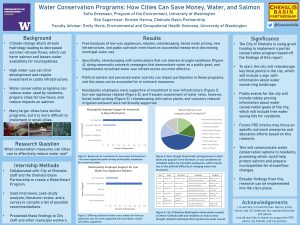WATER CONSERVATION PROGRAMS: HOW MUNICIPALITIES CAN SAVE MONEY, WATER, AND SALMON
Climate change has led to increased variation of stream-flows, which can reduce the availability of water for people and river ecosystems. Ensuring that water is used as efficiently as possible by communities and municipalities can benefit stream ecosystems and provide more consistent and equitable water supply down the line. Municipal-level water conservation programs are a common method to reduce water-use overall and address these issues, but exploring how these programs can be more effective and comprehensive has implications to improve available water quantity. This study focuses on the various methods that cities can implement to reduce water use, how these methods can be more effective, and the level of support that municipal employees have for each of these options. Through case-study analysis, literature review, and informal interviews, a variety of water-conservation measures were collected. Then, the applicability of these metrics was evaluated through survey responses from local municipal employees. On the municipal side, it was found that cities can update and expand their infrastructure, change their water rate structures, and participate in behavior-changing outreach efforts to reduce water-use. On the residential side, landscaping changes and replacement of high-use water appliances can also effectively reduce use. These options can effectively reduce water-use and better prepare residents, stream ecosystems, and municipalities for hydrological alterations due to climate change and they do so without reducing equity in water access or income for municipalities.
